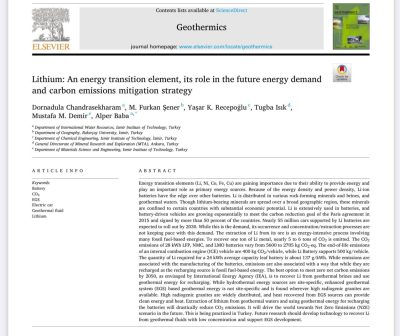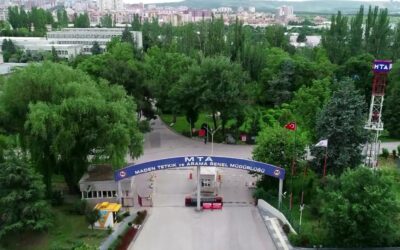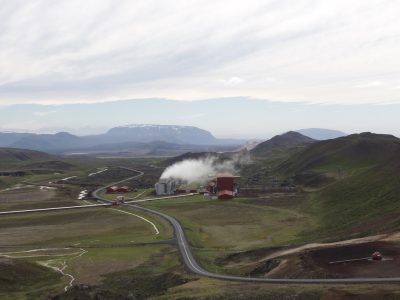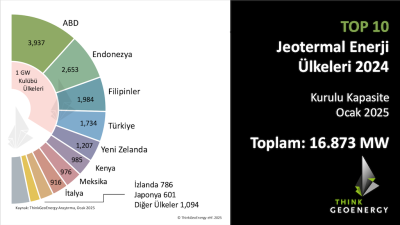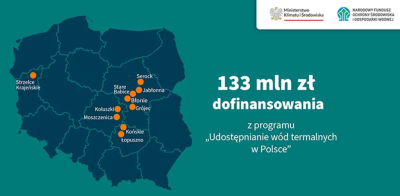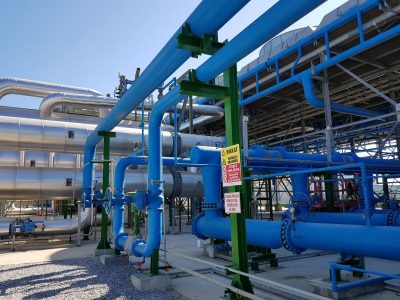Nevada positions itself as geothermal center in the U.S.
Reno/ Nevada is increasingly attracting geothermal companies to locate in the state, helping to create a geothermal center in the U.S. in the state with most of the geothermal development in the U.S.
Recent news on the “decision of Vulcan Power Co. to locate its corporate headquarters in Reno marks a significant milestone in the region’s efforts to become an international center for the industry.”, so local news from Reno, Nevada.
According to the author, “executives who are leading the push to build the presence of the geothermal industry say they’re targeting far more than than construction and operations jobs at geothermal sites across northern Nevada.
They want the Reno area to serve as a center for high-value professional jobs — geothermal research, project engineering, natural resource law — as well as manufacturing of equipment for geothermal projects worldwide.
“We’re trying to build a cluster,” says Jason Geddes, who’s helping to recruit geothermal companies in his role as environmental services administrator for the City of Reno.
Vulcan Power helps build that cluster.
The company this week will host Sen. Harry Reid as it officially opens its corporate office in South Meadows. The company currently employs about 30 in Reno and projects that its employment in the new office could double within the next 18 months.
Vulcan Power, which previously was headquartered at Bend, Ore., decided to move to Reno because the city is near its major projects, said Craig Mataczynski, its chief executive officer.
The company has a half dozen geothermal power projects under development in Nevada, and about 90 percent of the 170,000 acres of geothermal leases it holds are located in Nevada.
After raising $108 million from an affiliate of Denham Capital last winter, Vulcan began moving aggressively to get a geothermal plant near Fernley into production during the next 24 months.
Then, too, Mataczynski was drawn by the developing community of geothermal companies in the region. That will make recruitment easier, he said, and will help create a network of suppliers and professionals.
The city already is home to Ormat Technologies, a major player in geothermal projects as well as the business of supplying components to geothermal developers worldwide.
Ram Power, a publicly held company developing geothermal projects in the United States, Canada and Latin America, is headquartered in Reno.
Oski Energy, which has 12 projects under development in the West, is headquartered just around the corner from Vulcan in South Meadows. Other geothermal companies from around the world are locating regional offices in the Reno area to be close to projects they’re developing in Nevada.
Officials of the City of Reno and the Economic Development Authority of Western Nevada look to widen the geothermal presence in the region when the two organizations serve as one of the biggest sponsors of the annual meeting of the Geothermal Resources Council in Sacramento in late October.
Tom Matter, a business development manager for EDAWN, says the event draws about 1,500 executives from all aspects of the geothermal industry — everyone from consultants to manufacturers of hardware.
“We’re targeting all of them,” Matter says.
Geddes says the city and EDAWN is particularly interested in developing a network of engineers, lawyers, financial experts, manufacturers and others to support the geothermal industry.
A robust community of suppliers to the industry, he says, will serve to attract even more headquarters operations. And more headquarters will draw more suppliers.
That, in turn, would draw fresh dollars into the region’s economy as geothermal suppliers in the Reno area work on projects throughout the world.
In fact, a model already exists for development of an industry originally built on Nevada resources that now provides expertise to projects around the world.
“It leverages the mining history we have,” says Geddes. “We’ve been doing this for 150 years.”
The campaign to build a cluster of geothermal companies in Reno got a boost in March, when the U.S. Department of Energy awarded the University of Nevada, Reno a $1.2 million grant to develop the National Geothermal Institute, a consortium of top geothermal schools, including the Massachusetts Institute of Technology, Cornell University, Stanford University, the Oregon Institute of Technology and the University of Utah.
The institute, to be developed at the UNR’s Redfield Campus — itself in the shadow of a major Ormat geothermal installation at the south edge of Reno — will draw students and researchers from around the country to learn about the business and the engineering of geothermal plants. “This is huge,” says John Hester, community development director for the City of Reno.
The Ormat facilities in south Reno also are an important sales point for the city, Hester says. The City of Reno has permitted geothermal plants with capacity of 107 megawatts within the city limits, and Reno is the only sizable city in the United States that produces enough power from geothermal sources to meet all of its residential demand.
Owners of major office buildings have thrown their support behind the recruitment effort as well, viewing geothermal-related companies as one way to reduce high vacancy rates.
As EDAWN’s sales team recruits geothermal companies and their suppliers, it also focuses on the state’s support of renewable energy — including a 55 percent tax abatement on some investments — as well as the availability of training programs for technicians and professionals alike.
Then, too, Hester notes that are officials of local governments have shown an ability to help clear regulatory roadblocks that have stood in the way of renewables projects.
But Matter says that tight capital markets often restrain geothermal-related companies from moving to the Reno area.
And even if companies can tap the capital they need to finance a move, he says that executives who aren’t able to sell their current house aren’t eager to move to Reno — or anywhere else — until the residential market improves.”
Source: Northern Nevada Business Weekly







